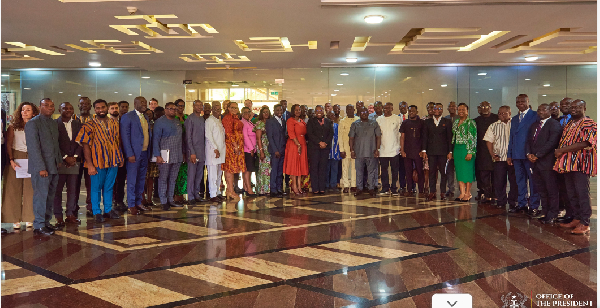Julius Debrah, Chief of Staff at the Presidency, has inaugurated a working group to develop a new National Anti-Corruption Strategy, as part of concerted efforts to check widespread corruption in both public and private sectors.
The previous National Anti-Corruption Action Plan (NACAP) was passed by Parliament in 2014, during the first term of President John Dramani Mahama.
Debrah in his remarks during the inauguration of the Group at the Presidency in Accra, noted that destiny had, once again, bestowed on President Mahama the responsibility of shepherding the development of the second national anti-corruption strategy.
He said in the statement delivered by Ghana at the recent first resumed 16th Session of the Implementation Review Group (IRG) and the open-ended intergovernmental working group on the prevention of corruption at Vienna, Austria from 16th-20th June, some achievements of NACAP were reported.
He said the Implementation of NACAP led to an increased awareness of the havoc caused by corruption and available reporting mechanisms, including whistleblowing.
Furthermore, it led to an accelerated digitisation of financial services, revenue authorities, and ports and harbours, leading to improved efficiency and reduced discretion.
Others are an enhanced stability and soundness of the financial system through Financial Stability Council, making Ghana the second country after Mauritius to establish such a Council in sub-Saharan Africa.
In addition, it led to a reduction in sexual harassment and sextortion, supported by workplace-safe reporting mechanisms.
The report also mentioned the implementation of the National Anti-Money Laundering/Combatting the Financing of Terrorism and Proliferation of Weapons of Mass Destruction (AML/CFT & P), Guidelines for Banks and Non-Bank Financial Institutions in Ghana.
Debrah said during this period, Ghana witnessed increased operational activity from key anti-corruption and law enforcement agencies such as the Commission on Human Rights and Administrative Justice (CHRAJ), Office of the Special Prosecutor (OSP), and the Economic and Organised Crime Office (EOCO), in both administrative and criminal investigation, prosecution, and asset tracing, seizure and recovery.
He said however, it was also worth noting that after Ghana’s best performing score of 48 per cent on the Corruption Perception Index (CPI) in 2014—the year the NACAP was passed by Parliament—the implementation of NACAP from 2015 2024, had coincided with a downward trending of the country’s CPI score to the current all-time low of 42 per cent in the last year of the NACAP.
Debrah said: “We have to reverse this trend, and I charge this group to ensure that the strategy does precisely that. This is consistent with the promise that His Excellency the President made to Ghanaians.”
He said accountability and the fight against corruption constitute a key pillar in the legacy term of President Mahama.
Debrah said the complexities of corruption that confront Ghanaians today equally requires a sophisticated approach to combating it.
This, he said, requires the application of technology, outside-the box thinking, effective legislation, independent anti-corruption institutions, a strong political will and a focused leadership to be able to uproot this canker from society.
The Chief of Staff noted that it was therefore their expectation that the design of the new National Anti-Corruption strategy should depart somewhat from the assumptions, programmes and implementation mechanisms of the previous NACAP to enable them to achieve meaningful, sustainable results within the shortest possible time.
He reiterated that ethics must be a key pillar in the development of the next National Anti-corruption Strategy because corruption was first and foremost a morale issue before legal.
He said the Strategy therefore ought to provide shock therapy to the anti-corruption space to set the anti-corruption fight to a beating, impactful rhythm.
The Chief of Staff said the National Anti-Corruption Strategy would be coordinated by the Office of the Presidential Advisor, National Anti-Corruption Programme (PANACP) working closely with his office through the Deputy Chief of Staff (Administration).
He said this would enable the President to track its implementation to ensure that the programme delivers on its mandate.
Debrah said the Office would work closely with principal implementing partners such as the office of the Attorney General, the Office of Special Prosecutor (OSP) and the Commission on Human Rights and Administrative Justice (CHRAJ) to ensure that they confront the corruption menace that had eaten into their social fabric.
He expressed gratitude to CHRAJ for coordinating Ghana’s foremost anti-corruption plan in the last decade.
He assured them that the Office of the President would continue to work closely with them in promoting Human Rights and Administrative Justice in Ghana and beyond.
He expressed confidence in the technical expertise of the team that had been assembled to deliver Ghana’s next anti-corruption strategy.
“We therefore expect nothing less than your fullest commitment to the cause, so as to deliver an initial draft of the next National Anti-corruption Strategy by the 31st of August 2025,” he said.
Professor Francis Dodoo, Presidental Advisor for National Anti-Corruption Programme, said the initiative marks yet another decisive step by the President and the Government of Ghana in their collective resolve to eliminate corruption and its corrosive effect and to strengthen integrity, promote transparency, and uphold ethical governance at all levels of their national life.
